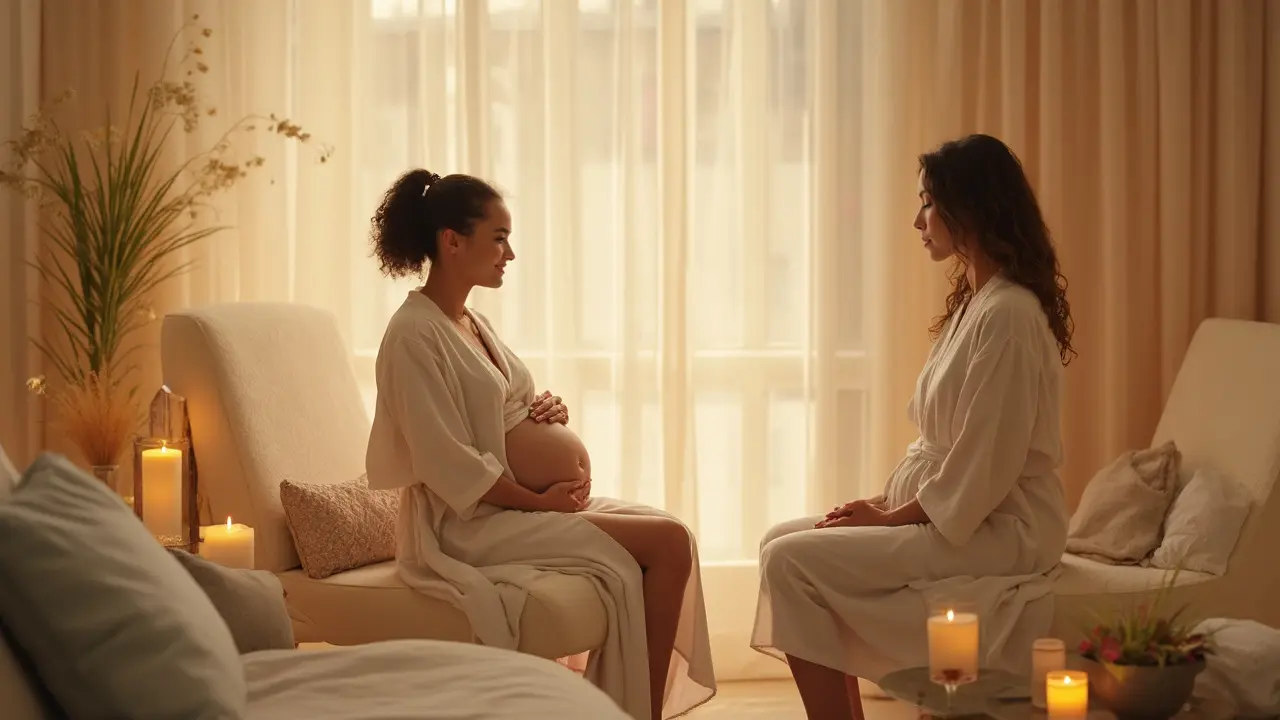Think all massages are the same? Not when you're pregnant. Everything changes—from your body’s aches to how you lie on the table. In London, the options for pregnancy massage seem endless, but not every massage therapist knows what they’re doing with an expectant mum in front of them.
The stakes are high: you want to ease back pain, tackle swollen legs, or just switch off for an hour. But it's got to be safe, especially for your growing bump. The right therapist in London will know which strokes to use (and which to avoid), when you should steer clear, and how to spot red flags if something feels off.
If you’re wondering whether your regular massage spot can handle pregnancy sessions or if you need a specialist, you’re in the right place. Let’s break down what actually sets pregnancy massage apart—and how to make sure you’re getting the real deal in the capital.
- Why Pregnancy Massage Matters
- How to Spot a Qualified Therapist
- Choosing the Right London Spa or Studio
- What Really Happens During a Pregnancy Massage
- Tips for a Safe and Great Experience
Why Pregnancy Massage Matters
Pregnancy does a number on your body. Your back aches, your muscles get tense, and let’s not even start with those swollen ankles. That’s where a pregnancy massage London service can really help—when it’s done by someone who truly knows what they’re doing.
What makes pregnancy massage different? For starters, it’s not just about relaxation (though that’s definitely a perk). Studies from the National Institutes of Health show pregnancy massage can help cut down swelling, improve sleep, and even lower anxiety and depression rates in expectant mums. In fact, one trial in 2021 found pregnant women who went for regular massages reported 60% less back pain than those who skipped it.
During pregnancy, your body pumps about 50% more blood. That means circulation changes and swelling become fairly common. Massage helps move extra fluid, making it easier for your body to get rid of what it doesn’t need.
- Reduces swelling in hands, feet, and legs
- Relieves back, neck, and shoulder pain
- Calms nerves and eases mood swings
- Improves sleep quality (which honestly, is gold during this time)
But it’s not just a case of lying down and letting someone work your muscles. There are special techniques, different pressure points to avoid, and a list of things your therapist needs to watch for—like avoiding deep massage on the legs in case of blood clots.
| Benefit | How Common in Pregnancy | Impact of Massage |
|---|---|---|
| Back pain | Up to 80% of women | Can reduce pain by up to 60% |
| Swelling (Edema) | About 75% | Noticeable relief after 3 sessions |
| Anxiety | 40-50% | Helps lower cortisol levels |
The bottom line? If you’re dealing with any of this (and honestly, most pregnant women are), finding a therapist who knows pregnancy inside out is more than a luxury—it’s about staying sane and comfortable as your due date gets closer.
How to Spot a Qualified Therapist
If you want a pregnancy massage in London that’s actually good for you, you need someone with more than just a general massage certificate. Ask if they have extra training in prenatal or pregnancy massage—this should be from a recognized place like the London School of Massage or similar. A real pro won’t mind showing their certificates or listing their training on their website. If you don’t see any mention of maternity or prenatal training, move on.
Insurance matters too. The right therapist should have insurance that covers pregnancy massage. It’s a small detail, but it’s a good sign they take their work seriously. And let’s face it, mistakes can happen—so you want that backup just in case.
Never feel awkward about asking questions, either. Here are a few you can throw at them before booking:
- How much experience do you have with pregnant clients?
- What’s your approach if the client has high blood pressure or other pregnancy issues?
- Do you adjust routines for different trimesters?
- Can you give references or reviews from expectant mums?
If their answers are hesitant or vague, that’s a warning sign. Someone who specializes in pregnancy massage London will have clear, confident responses and lots of stories from people just like you.
Here’s a quick look at what a solid pregnancy massage qualification might look like across London’s top providers:
| Provider | Typical Qualifications | Year Established |
|---|---|---|
| London School of Massage | Pregnancy Massage Diploma | 1994 |
| Neal’s Yard Remedies | Specialist Maternity Massage Certificate | 1981 |
| Bodyology Massage School | Level 3 Maternity Massage Training | 2009 |
Don’t forget to check out reviews. Real stories from local mums beat slick marketing every time. Google, Trustpilot, and even local Facebook groups for parents in London can show you who’s the real deal and who might just be padding their Instagram.

Choosing the Right London Spa or Studio
London’s packed with spa choices, but not all are geared for pregnant women. Here’s where you need to be sharp. The top thing to check is whether the spa offers pregnancy massage London sessions led by certified prenatal therapists. They need specific training—standard massage certificates just don’t cut it for expectant mums.
Another green flag: the spa or studio should ask for details about your pregnancy upfront. If they don’t care if you’re in your first or third trimester, walk away. Some places have special pregnancy cushions and adjustable tables to keep you safe and comfy—ask about these before you book. If it’s just towels stacked under your hips, that’s a sign they’re not specialists.
Let’s get specific. Some well-known places in London with solid reputations for prenatal care include:
- Urban Retreat at The White House in Knightsbridge
- Absolute Spa at The Chelsea Health Club
- The Spa at Mandarin Oriental Hyde Park (which even has doctors who consult for them)
Always cross-check reviews. Real clients talk about how they felt before, during, and after—and whether therapists truly listened to their needs. Look out for comments about personalized adjustments, cleanliness, and how well staff communicate—they’re a big deal when safety’s at stake.
Wondering what you’re likely to pay? Here’s a quick comparison of typical prices for reputable London spas (2025 rates):
| Spa Name | Session Length | Price (GBP) | Notes |
|---|---|---|---|
| Urban Retreat | 60 min | 120 | Certified prenatal specialists |
| Absolute Spa | 55 min | 100 | Pregnancy support pillows available |
| Mandarin Oriental | 75 min | 150 | Doctor consultation recommended for high-risk cases |
While price matters, you can’t put a value on safety and peace of mind. Make sure the spa asks about your medical history, has clear rules on what’s safe for each stage, and adjusts the treatment for you individually. That's how you know you're in good hands.
What Really Happens During a Pregnancy Massage
First off, good news—you can stay fully clothed if that feels right or undress to your comfort level. Before anything starts, your therapist will usually ask loads of questions about how far along you are, how you’ve been feeling, and which areas hurt the most. They need to know if you’re high-risk or have any special medical issues, because that affects what they can safely do.
Next, your position on the table is a big deal. Lying flat on your belly is out—most spots use a special side-lying technique with pillows for support. This keeps the pressure off your bump and your back. A lot of clinics in London have pregnancy pillows that let you lie half on your side, which is a total game-changer if you can’t get comfy lying down at home. Some places use massage tables with belly cut-outs, but most experts stick with padded pillows for safety.
As for the actual massage, the pressure is gentle, not deep. You won’t get poked or prodded where you shouldn’t, especially around the lower legs and ankles. There’s a reason for that—the risk of triggering pressure points that could, in rare cases, stir up contractions. Don’t expect too much on your feet if you’re far along! Your back, shoulders, and especially hips usually get the most attention, since most mums-to-be carry tension there.
A typical pregnancy massage London session lasts about 60 to 90 minutes. Take a look at the general timeline below:
| Part of Session | What Happens |
|---|---|
| First 10 minutes | Consultation & setup, questions about health |
| 15-60 minutes | Gentle massage (side-lying, pillows, focus on problem spots) |
| Final 10-20 minutes | Finishing massage, slow return to sitting/standing, aftercare tips |
Your therapist might use unscented oil to avoid triggering morning sickness or allergies. If you want something specific, don’t be shy about asking. Some mums like calming scents like lavender, but anything too strong can make you queasy, especially early on.
During the massage, you’ll be encouraged to speak up if something hurts or feels weird. It’s totally normal to need a break, a bathroom run, or a reposition. No therapist worth their salt will make you feel rushed or uncomfortable.
You might notice your arms and legs get a little puffy or tingly after—totally normal, since massage helps shift fluid buildup. The real test? Most mums say they sleep miles better the night after. If you don’t feel relaxed or notice an improvement, it’s a sign that the session or therapist might not be the right fit.

Tips for a Safe and Great Experience
Here’s the lowdown: nothing trumps safety when you’re going for a pregnancy massage London session. London’s a hotspot for every type of spa experience, but pregnancy brings its own rules and must-dos. Let’s get straight to what matters most.
- Talk to Your Midwife or GP First. If you’re in your first trimester, many therapists won’t book you in—and that’s not just a rule, it’s for a reason. Make sure your health team says you’re good to go, especially if you have a high-risk pregnancy.
- Find a Certified Therapist. Don’t just trust a fancy website. Ask if your massage therapist is trained for pregnancy. Look for a “Pregnancy Massage” or “Prenatal Massage” certification and check if they’re listed with UK accredited bodies (like the FHT or STA).
- Know Your Positioning. Lying flat on your back? Not great once you hit 16 weeks because it can press on a major vein. Most London therapists will offer a special pillow or side-lying support—if they don’t, ask.
- Be Open About Symptoms. Headaches, swelling, cramps—let your therapist know. A good one will adapt, avoid any sore areas, and skip certain pressure points that could trigger early labour (like the ankles or between fingers and toes).
- Hydration is Key. You’ll be moving fluid around during your massage. Drink up before and after—water makes the difference if you want to cut down on any post-massage lightheadedness or soreness.
Pregnancy massage isn’t just pampering; the benefits are proven. A National Institutes of Health study in 2022 showed that regular prenatal massages can lower cortisol (your stress hormone) and reduce lower back pain by up to 60%. Here’s a quick look at the benefits, according to real research:
| Benefit | What the Research Shows |
|---|---|
| Stress Reduction | Up to 30% lower cortisol after sessions |
| Back Pain Relief | 60% of women report less pain after 3 sessions |
| Better Sleep | 50% better sleep quality in third trimester |
| Reduced Swelling | Noticeable reduction in ankle and foot swelling after weekly massages for 4 weeks |
After your session, take it easy. Don’t rush off to the Tube or walk a mile home carrying shopping bags. Give yourself a few minutes to sit, sip water, and let your body adjust. If anything feels off (like dizziness, bleeding, or cramps), call your midwife immediately. Most problems don’t start at the table, but it’s always better to catch them early. Baby steps, literally.





